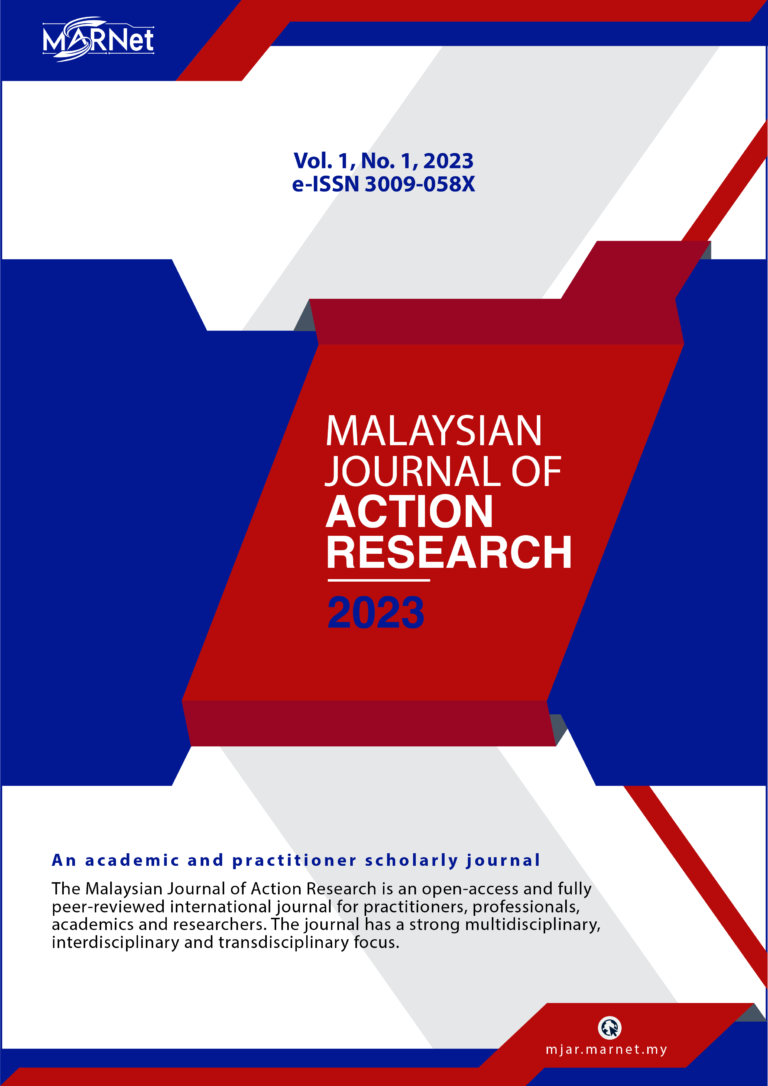MJAR
An academic and practitioner scholarly journal
Malaysian Journal of Action Research
The Malaysian Journal of Action Research is an open-access and fully peer-reviewed international journal for practitioners, professionals, academics and researchers. The journal has a strong multidisciplinary, interdisciplinary and transdisciplinary focus. It seeks to facilitate discussion and debate that crosses the boundaries of professional contexts and domains, including education, nursing, social work, allied health professions, business and management, computer science and the criminal justice sector.
Editorial Team
Editor-in-Chief

Assoc Prof Dr Sarimah Shaik Abdullah
Universiti Utara Malaysia
Managing Editor

Dr Yoon Sook Jhee
SEGi University
Manuscript/Web Editor

Dr Mohd Syafiq Aiman Mat Noor
University of Leeds, United Kingdom
Editors
Assoc Prof Dr Fariza Puteh Behak
Islamic Science University of Malaysia
Assoc Prof Dr Vishalache Balakrishnan
Universiti Malaya
Assoc Prof Dr Nadarajan Thambu
Sultan Idris Education University
Dr Nazatul Akmar Mokhtar
International Islamic University Malaysia
Dr Pang Jee Ching
SEGi University
Dr Zailah Zainudin
Malaysian Action Research Network
Dr Satirah Ahmad
Institut Pendidikan Guru Kampus Sultan Abdul Halim
Dr Amirul Shah Md Shahbudin
Universiti Sains Malaysia
Dr Hairul Faiezi Lokman
Institut Pendidikan Guru Kampus Ilmu Khas
Dr Romarzila Omar
Sultan Idris Education University
Dr Diani Mardiana Mat Zin
Islamic Science University of Malaysia
Assoc Prof Dr Hadiyanto Said
State University of Jambi, Indonesia
Dr Mukrim Tamrin
University of Tadulako, Indonesia
Editorial Assistants
Selvamalar Selvarajan
Politeknik Tuanku Sultanah Bahiyah, Kedah
Julianah Ahmad
Sekolah Pendidikan Khas Kota Kinabalu, Sabah
Hui Kar Loong
SJKC Kampung Baru Pajam, Negeri Sembilan

Aims and Scope
The Malaysian Journal of Action Research promotes professional growth in these fields of study by publishing manuscripts on evidence-based practice, reviews of current policy initiatives, examples of applied theories, and reports of original research in a language that is accessible and practical. It seeks to explore pedagogical practices using a variety of action research paradigms, philosophies and methodologies, including, but not limited to:
- Action case
- Action learning
- Action science
- Appreciative inquiry
- Autoethnography in action research
- Classroom-based action research
- Collaborative action research
- Community-based action research
- Community-based participatory action research
- Critical action research
- Critical participatory action research
- Educational living theory research
- Emancipatory action research
- Industrial action research
- Living theory research
- Participatory action research
- Practical action research
- Self-study action research
- Soft system approaches
- Technical action research
- Theory of practice architectures research
Author Guidelines
The editors welcome the submission of a wide variety of high-quality original action research manuscripts in a range of styles and genres, drawing on a variety of action research paradigms, including:
- Reports on action research
- Short pieces of research in progress
- Impact accounts
- Photo essays
- Telling stories
- Reflections on policy in practice
- Informed and analytical accounts of innovative practice
- Critiques of recent policy developments
- Conversations/Dialogues and interviews
- Book reviews
The Malaysian Journal of Action Research is also keen to encourage authors to take the first step in initiating public conversations, and provides proactive support for new writers. The journal will be flexible about article ‘size’ and will welcome contributions of different lengths to reflect the variety of contribution types outlined above. For guidance, authors might submit:
- 5,000-7,500 word peer-reviewed articles
- 1,000-2,500 word peer-reviewed ‘reflective pieces’ or ‘thought pieces’
- Up to 1,500 word stories that are close to the writer’s heart and that give meaning to their professional career
The manuscript must also deal with one of the key topics of the journal (a variety of action research paradigms, philosophies and methodologies); otherwise, it will not be accepted.
General Information
Manuscripts can be accepted either in English or Bahasa Melayu. If authors are not native speakers, the use of proofreading and copyediting services is strongly recommended. This helps to avoid desk rejection and negative comments from reviewers. Additionally, a sufficiently high level of language prevents delays in the review process.
A typical manuscript of an action research report should consist of the following sections: Title, Abstract, Keywords, Introduction, Methods, Results, Discussion, Conclusion, Acknowledgements, References, and Appendix (if necessary). Reflective pieces and stories usually do not need to have the IMRAD structure. However, they should have specified objectives and must include citations and/or a literature review.
The abstract should be between 80 and 120 words for all types of manuscripts. Each manuscript should contain at least 5 keywords. All keywords must follow alphabetical order, separated by commas. Manuscripts in Bahasa Melayu should include an additional title, abstract and keywords in English.
The introduction should provide a brief review of the current state of the research area, citing relevant sources from journals and conference proceedings listed in databases such as Web of Science (WoS), Scopus, or ERIC. The introduction should lead to a clear problem statement or objective of the manuscript, and conclude by outlining the subsequent sections.
Given that the primary audience of the journal is based in Malaysia, it is imperative to ensure that your manuscript includes pertinent citations that resonate within the Malaysian context. Moreover, the inclusion of studies conducted in Malaysia further solidifies the relevance of your research to our readership. These considerations are instrumental in building a meaningful dialogue within the Malaysian academic community and contributing to the local body of knowledge.
The methods section should describe the research methods employed and provide details on the plan of action. If the manuscript builds upon the author’s previous work, it is important to briefly reference this work and describe how the present paper builds on it.
The results section should present the main findings and goals achieved, aligning with the described plan of actions. It is essential to maintain a clear structure and address the main objective stated in the introduction, ensuring all relevant findings are presented.
The discussion section holds significant importance in the manuscript. Authors should compare their findings with other relevant works in the field, discussing the applicability, strengths, and limitations of the results. If a problem was identified, potential solutions should be proposed. It is crucial to include a proper and comprehensive discussion, as manuscripts without a thorough discussion may lead reviewers to have reservations.
The conclusion should summarise the manuscript and highlight its key points. Authors may also provide valuable insights into potential research directions by suggesting topics for future work. It is important to maintain conciseness in this section, ensuring that it remains focused and does not exceed half a page.
In the case of empirical studies, authors are mandated to include a statement detailing the ethical approval obtained for the study. This should specify the reviewing body or organisation that granted the ethical clearance for the research, and a reference number for the approval (if available).
A reference list should be included at the end of the manuscript, with the references compiled in ascending alphabetical order.
Copyright
All rights reserved. No part of this publication may be reproduced, distributed, or transmitted in any form or by any means, including photocopying, recording, or other electronic or mechanical methods, without the prior written consent of the Malaysian Action Research Network, to whom all requests to reproduce copyright material should be directed.
Disclaimer
The Publisher, the Malaysian Action Research Network (MARNet) and Editors cannot be held responsible for errors or any consequences arising from the use of information contained in the Malaysian Journal of Action Research; the views and opinions expressed do not necessarily reflect those of the Publisher, MARNet and Editors, neither does the publication of advertisements constitute any endorsement by the Publisher, MARNet and Editors of the products advertised.
Publisher
- Malaysian Action Research Network (MARNet)
- Registry of Societies (ROS) of Malaysia: PPM-013-05-02092021
- Address: 19, Jln RK6/22 Rasah Kemayan 70300 Seremban Negeri Sembilan, Malaysia
- +601157616384
- Email: mjar[a]marnet.my
- Website: https://www.mjar.marnet.my/
Get In Touch
Contact
If you have any questions, please do not hesitate to contact the Editorial Assistants or fill out the form below.

Mrs Selvamalar Selvarajan
mjar[a]marnet.my

Ms Julianah Ahmad
mjar[a]marnet.my

Mr Hui Kar Loong
mjar[a]marnet.my
